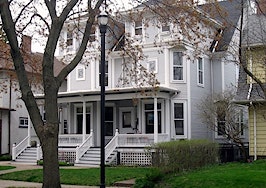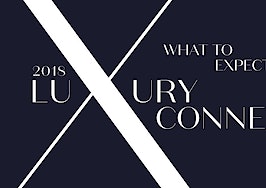This summer we’re looking at the state of the luxury agent and broker in today’s increasingly complex real estate market. In October, we’ll gather in Beverly Hills at Luxury Connect to share best practices, network and create a blueprint for the luxury agent/broker of tomorrow. Don’t miss it.
Luxury home listings are a different beast compared to their less expensive counterparts. But they do share one thing in common: If a luxury home sits on the market longer than average, the result will be a lower sale price, and other costs will add up quickly. For both real estate agents and their clients, this can be a big concern.
Average time it takes to sell a luxury home
Luxury clients may not be aware that, statistically, their homes are likely to stay on the market longer. It’s important for agents to prepare their high-end sellers for a bit of a wait.
How long?
According to Concierge Auctions’ 2017 Luxury Homes Days On Market Index the most expensive homes in the country have an average days on market (DOM) of over 180 days. The average DOM for all luxury homes across the 40 markets that were analyzed was 531 days.
Of course, there are various factors that contribute to a luxury home’s time on market, the most notable being location. Some luxury home markets have an overall average DOM of under 180 days while others are closer to 1,000 days.
Knowing the statistics for your market is critical for setting expectations with clients.
More time on market equals lower sale price
All that time on market may not add up for luxury sellers. Bloomberg dug into the Concierge Auctions report further to discover how list time affects sale price. Luxury homes that sold in 180 days or less had a list-to-sale price of 93 percent. But when things stretched out well beyond 180 days, the owners only got 71 percent of the original list price.
Unlike many markets around the U.S., it’s a buyer’s market when you’re shopping for a luxury home. Buyers can, and do, take their time.
Inevitably, many sellers drop the list price in an effort to entice more buyers. But dropping the price diminishes the perceived value, which is the last thing a listing agent wants to do with a luxury property.
One way to combat this is to build a plan in advance with your clients that incorporates what you will do at key intervals and when you will ask them to consider a price reduction. This way there are no surprises.
These conversations should be fact-based using market statistics and data on showings, responses to advertising, etc., so the client is informed every step of the way.
The hidden cost of keeping a luxury home looking its best
Unfortunately, lower sale price isn’t the only cost consideration for luxury sellers. It costs a lot to maintain a luxury home while it’s on the market. A home can’t be shown with an overgrown lawn or a green pool, especially if the property is over the $1 million range. Luxury real estate is about selling a certain lifestyle just as much as the home itself.
Simply heating, cooling and lighting a luxury home can be a costly endeavor if the house is vacant. The annual utility cost at an average home is $2,200. But that’s for an average home with 2,300 or less square feet. Mansions that are 8,000 plus square feet will be over $550 a month to keep fully functional.
Costs for staging a sprawling estate can quickly add up the longer the home sits on the market. In my experience, the average cost for the services of a professional stager is $500-$600 per room per month.
Experts have noted that staging can help sell a home quicker, but if that isn’t the case, the combination of staging and maintenance can be a burden on the client. Some agents offer to share this expense during the sales process with the client.
Pricing is the key to a quick sell in luxury real estate
A fair amount of psychology goes into pricing homes at all price levels. Many listing agents also rely on comparables (comps) to come up with a list price. And therein lies the problem for agents who have a luxury home to sell. The home’s history, past ownership, craftsmanship, location and other intangibles frequently play a role.
Luxury homes are often custom, which makes it difficult to find good comps. It’s not uncommon to come across one-of-a-kind or even downright strange million-dollar homes that are unlike anything that’s been sold in the area.
Laurie Moore-Moore, founder of the Institute for Luxury Home Marketing (ILHM) noted in an interview with Mansion Global that luxury home pricing also isn’t about price-per-square-foot.
Luxury real estate agents have to understand the history and architecture of their market, which can come into play when pricing and selling high-end homes. That knowledge must be paired with a comprehensive understanding of the latest home technology and trends that appeal to luxury buyers.
Luxury buyers want the latest conveniences but also want to know that the property they are purchasing has details that truly set it apart.
Active comps can be used for baseline pricing for high-end luxury homes and getting a feel for the current market, but the distinct differences of a property still have to come into the equation.
For agents, this can require deeper research into the home to determine what factors may add specific value. Part of pricing can also involve the client’s initial outlay in customizing the property. Clients may also believe they can receive an outsized return on their investment.
Guiding a luxury property from listing to sale requires a combination of establishing an initial price, evaluating the market, factoring in maintenance and upkeep costs, and having regular conversations about when to adjust the price as needed.
Simply because the process of selling luxury homes can take longer, a finely honed listing and marketing strategy is required from day one through the end of the listing period. Hopefully a sale will occur prior to the end of the listing, but a plan should be in place with marketing and sales tactics outlined for the entire timeframe regardless.
Thinking of bringing your team to Luxury Connect? There are special onsite perks and discounts when you buy those tickets together too. Just contact us to find out more.
Laura Brady is the Founder and President of Concierge Auctions. You can follow her on Instagram or LinkedIn.
Laura Brady will be joining real estate’s leaders this April 8-10 for Inman’s annual retreat, Disconnect in the Desert, in Palm Springs. It’s an invite-only gathering, and tickets are limited. If you think we missed you, drop us a line.








